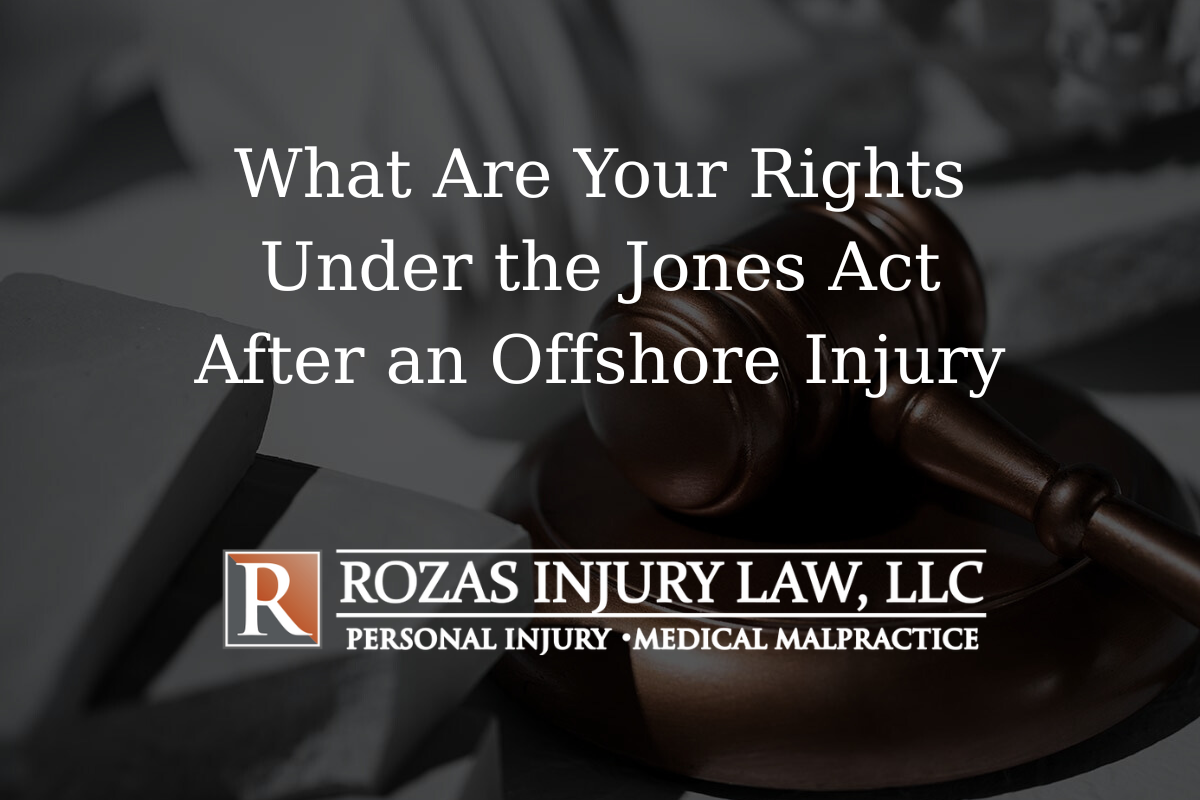You didn’t ask for this. One moment, you were doing your job offshore — hauling lines, fixing equipment, or navigating rough water. Next, you’re in pain, facing a serious injury with no clear roadmap forward. Whether you were hurt on a crew boat in the Gulf, a drilling rig off the coast of Louisiana, or a fishing vessel near Grand Isle, the Jones Act may protect you. And you have more rights than you probably realize.

How the Jones Act Protects Injured Maritime Workers
The Jones Act — also called the Merchant Marine Act — gives injured maritime workers a legal path to hold their employer negligent if the injury was caused by unsafe conditions or mistakes on the job. This federal maritime law applies to many who work on vessels in navigable waters, not just full-time crew. If you’re a Jones Act seaman, you don’t have to settle for just workers’ compensation.
Unlike land-based injuries, these claims follow general maritime law and give you the right to seek compensation for lost wages, medical expenses, and even punitive damages in some cases. You may also be entitled to maintenance and cure, a separate benefit that covers daily living costs and immediate medical treatment regardless of fault.
Who Qualifies as a Jones Act Seaman?
To be covered, you must qualify as a Jones Act seaman. This means you spend at least 30% of your working time on a vessel — not just cruise ships or tankers, but also fishing boats, drilling platforms, and support vessels common in the maritime industry. It includes harbor workers, scientific personnel, and contract workers aboard qualifying vessels.
Even if you were a sailing school student or sailing school instructor, the Jones Act applies in certain cases depending on vessel status and employment structure.
What Rights Do Injured Seamen Have?
When the injury occurred, your employer had a duty to provide a safe working environment. If the vessel was unfit — think faulty equipment, slippery decks, or unsafe conditions — your employer may be held liable. That’s the heart of a Jones Act claim: proving that your injury was caused by employer negligence or the vessel’s unseaworthiness.
Your rights include:
- Choosing your own doctor
- Receiving medical treatment and full coverage of medical bills
- Getting paid daily living expenses through maintenance and cure
- Reimbursement for lost wages and reduced earning capacity
- The right to sue employers for fair compensation
The Jones Act recognizes that maritime jobs are dangerous — but that doesn’t excuse avoidable injuries. You can also file under other maritime laws, such as the general maritime law or the marine act of 1920, depending on your role and the nature of the incident.
What Makes These Claims Complex?
You’ll be asked to prove details: how the injury occurred, whether the vessel was unseaworthy, if your employer knew about hazards, and whether you filed an accident report in time. Documentation like medical records and clear timelines matter.
Many injured workers hesitate to file a claim because they’re unsure if they qualify or fear backlash. Some don’t even know that the insurance company involved doesn’t have to act in your best interest. Waiting too long could affect your ability to recover anything.
Real Risks Louisiana Offshore Workers Face
We’ve seen offshore incidents across the Louisiana coastline — from workers injured on crew boats near Fourchon, to injured offshore roughnecks in the Gulf, to Jones Act seamen on shrimp boats out of Houma suffering from fractured ribs after being thrown against a bulkhead. These aren’t rare or isolated cases. And every story reminds us how high the stakes are.
Many thought they had to use the company’s doctor. Or that they didn’t qualify because they weren’t full-time crew. Or that because they didn’t have obvious injuries at first, they had no case. The truth is, the law is on your side more than your employer may tell you.
Your Legal Options After a Maritime Injury
You don’t have to navigate the claims process alone. After a serious work injury, talking to an experienced maritime attorney can help you understand your legal options and avoid costly mistakes. Whether you’re filing under the Jones Act, general maritime law, or federal maritime law, the decisions you make early on matter — including your choice of doctor, documentation, and how you bring Jones Act claims forward.
You’re not just a case. You’re an individual member of the workforce, and your future matters.

Talk to an Experienced Maritime Lawyer at Rozas Law Firm
You don’t have to go through this alone. If you’re an injured maritime worker wondering about your rights under the Jones Act, the team at Rozas Law Firm is ready to help you get answers. From maintenance and cure to holding vessel owners accountable, our experienced maritime lawyers can guide you through every step. Start your recovery with a free consultation and learn how to seek compensation that reflects your loss and your worth.
FAQ
Who qualifies as a Jones Act seaman in Louisiana?
You must spend at least 30% of your work time on a vessel in navigable waters. This includes oil rig workers, deckhands, cooks, and others aboard fishing boats or drilling vessels out of Louisiana ports.
Can I use my own doctor under the Jones Act?
Yes. You have the right to choose your own physician and are not limited to a company-approved medical provider.
What if I didn’t file an accident report right away?
You should still speak to a lawyer. Delay doesn’t always disqualify your claim — especially if your injury worsened over time. But time matters, so act quickly.
Can I get paid while recovering after an offshore injury?
Yes. Maintenance and cure provides payment for basic living expenses and medical care until you’ve reached maximum recovery, regardless of fault.
What’s the difference between the Jones Act and workers’ comp?
The Jones Act allows injured maritime workers to sue employers for negligence, something traditional workers’ comp doesn’t. It offers broader rights and legal protections for offshore workers and seamen.
Do I need an experienced maritime lawyer?
Yes. These cases involve complex federal maritime law, strict deadlines, and powerful insurance teams. Having an experienced attorney who understands maritime employers and how to navigate these systems gives you a much stronger chance at fair compensation.




